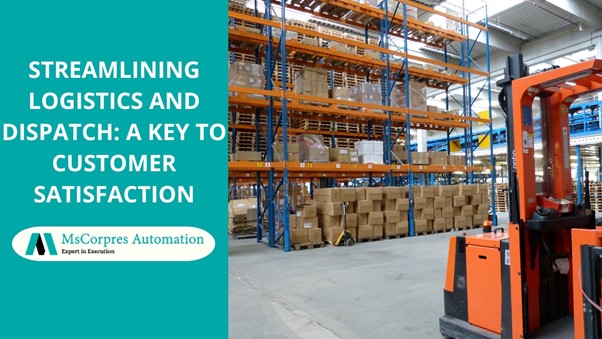What is Logistics Management?
Logistics management is the administration of supply chain management, which assists businesses in organising, supervising, and executing their logistics and storage procedures. Inbound and outbound transportation, fleet management, inventory control, supply/demand planning, order fulfilment, warehousing, material handling, logistics network design, and administration of third-party logistics service providers are typical logistics management tasks.
Customer service, sourcing and procurement, production planning and scheduling, packaging, and assembly are all included in logistics management to various extents. All phases of planning and execution, including tactical, operational, and strategic, involve logistics management. Additionally, it connects logistics operations with marketing, sales, production, finance, and information technology, as well as organises all logistics-related activities.

In layman’s terms, imagine you are baking a cake for a friend’s birthday. Logistics is like getting all the ingredients (flour, sugar, and eggs) from the store to your kitchen and making sure they arrive fresh and ready to use. In business, logistics is about managing the movement of goods (the ingredients) from manufacturers (the supermarket) to customers (your friend). We hope that helped you understand logistics management in an easy way!
Importance of Logistics Management
Companies need logistics management for a variety of reasons. Effective logistics management makes sure that product shipping is affordable, secure, quick, and efficient. As a result, customers are happier, and businesses save costs.
Poor logistics management, on the other hand, can cause shipments to be delayed or damaged, which may result in unhappy customers, returns, and items being ruined. Effective logistics management involves careful planning, appropriate software system selection, appropriate vendor screening and selection, and sufficient personnel to perform the operations in order to prevent unforeseen consequences.
What is Dispatch Management?
Dispatch management makes sure that products and services are delivered as quickly and efficiently as possible. This requires organising, monitoring, and controlling truck routes. It helps maximise delivery times and save expenses.
Dispatch systems use software tools to automate route development and optimise them for cost effectiveness. The primary objective of this system is to make sure that commodities reach their destination as quickly and economically as possible.

Dispatch management systems improve operational efficiency. This helps lower the number of trucks needed for delivery, schedule deliveries more effectively, raise the standard of customer care, and guarantee safety code compliance. In addition to offering continuous tracking and transparency of delivery locations, these solutions can help businesses run their operations more effectively and make smart decisions.
Businesses can improve customer satisfaction and profitability by managing the delivery of products and services efficiently.
What is the Dispatch Process?
The dispatch process is essential for the delivery of products and services to be done effectively and efficiently. The dispatch process comprises the following steps:
Step 1: Collecting Order
Order collection is the process of taking orders from customers and entering them into a database. When accepting orders from customers, precision is crucial since any errors might cause delays or even cancellations.
Step 2: Pre-Dispatch Verification
A dispatcher will review each order once it has been taken to make sure all the information is accurate and relevant. This includes confirming payment methods, shipping addresses, customer information, and product availability.
Step 3: Packaging
The dispatcher will pack the order for shipping, paying attention to any unique instructions that the customer may have given. To avoid damage during shipping, every item has to be wrapped securely.
Step 4: Shipping
After that, a carrier like FedEx, UPS, or the postal service delivers the order to its destination. To allow customers to track their orders and know when they should arrive, the dispatcher will provide tracking information.

Step 5: Confirmation of the Delivery
The dispatcher must verify that the package has reached its destination. This guarantees that every item has been delivered promptly and safely.
These actions are necessary to guarantee the centralised dispatching process’s effectiveness and efficiency, as well as to preserve customer satisfaction. By using these measures, businesses can reduce customer complaints and increase delivery efficiency.
Guidelines for Efficient Dispatch System
The following are some guidelines for a successful and productive dispatch system:
Describe your Business Procedures
Clearly define your business procedures. This will help optimise your dispatch process. What procedures must be followed in order to finish a job? What specific data do you want from your customers? You can find any sections of your process that might be inefficient or could use improvement by outlining it.
Provide Training to your Employees
It is essential that every employee receives the necessary dispatch procedure training. They should be proficient with the dispatch software and any additional tools required to finish their work. In order to interact with your customers in an efficient manner, they need also to be educated with the regulations and processes of your business.
Make the Most of Technology
Various software applications are available to assist you in optimising your dispatch procedure. Schedule, route, and invoice processing are just a few of the dispatching-related operations that may be automated using dispatch software. Utilising dispatch software allows you to give your employees more time to work on other projects.
Interact with your Customers
Good communication is necessary to make sure that the dispatch process runs smoothly. Customers should be informed about the progress of their jobs and know what to anticipate from their business. You can stay away from errors and any delays by informing your customers.
Review and Make Regular Improvements
Since the dispatch process is always changing, it is essential that you assess and revise protocols periodically. You can discover that, when new technology becomes available or as your company expands and evolves, some parts of your process need to be adjusted to stay effective. You can make sure that your process is constantly operating efficiently by checking it on a regular basis.
Significance of Dispatch Management in Delivery Processes
Dispatch management is essential for any delivery process. Businesses can use it to prioritise orders based on consumer demands, find, organise, and carry out efficient delivery routes, and guarantee that customers receive their commodities on time. Moreover, dispatch management keeps costs down by making the most use of delivery resources like staff and automobiles.
Delivery operations can improve customer satisfaction and profitability by optimising resource utilisation through effective dispatch management. Delivery businesses can improve driver fleet management, optimise route decisions, decrease customer wait times, and raise their operational efficiency by employing appropriate dispatch systems and technology.
Dispatch management not only saves money by lowering delivery-related expenses but also guarantees that consumers receive their items on schedule. Businesses may better anticipate customer demands and modify delivery by following the status of each driver and order. Due to the fact that customers receive regular information about their orders during the whole delivery process, customer satisfaction is increased.
Streamline your Logistics and Delivery with MsCorpres
A streamlined logistics and delivery method can be the difference between a business that makes it big and one that doesn’t. You can make sure that your deliveries are done on schedule and without any mishaps by taking the time to learn about your logistics and dispatch management options. You can select the most suitable option for your company.
Are you trying to increase efficiency and simplify your delivery process? Partner with MsCorpres. You will be able to effortlessly manage your fleet and optimise delivery routes for quicker and smoother deliveries. We offer detailed logistics and dispatch services created to improve your business’s supply chain efficiency. We help maintain customer satisfaction and your reputation through quick deliveries and simplified logistics processes.









